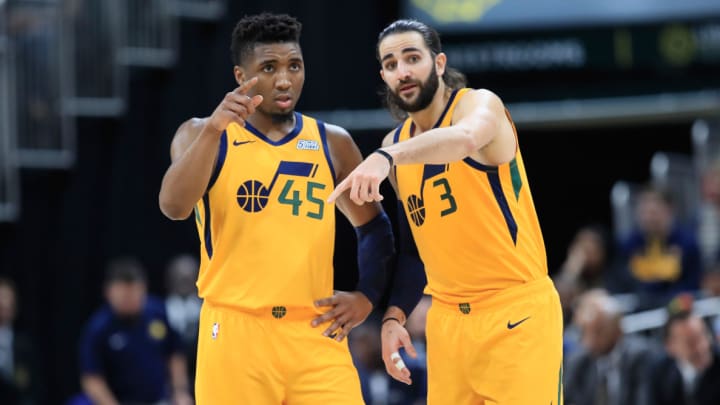With Expectations Sky High, the Jazz Stumble Out of the Gate

Even in a loaded Western Conference, it’s jarring to see the Jazz in 14th place through the first quarter of the season. Sitting at 9–12 following a blowout loss to Indiana on Monday night, Utah leads only perennial bottom feeder Phoenix in the West, a sharp deviation from preseason predictions. The Jazz were a trendy pick for second in the conference just over a month ago. Now, they are one of the league’s greatest early-season disappointments.
Utah’s roster is largely the same from its 48-win campaign in 2017-18. Six of its top seven rotatation players from last season remain on the current roster. So with its core intact and an offseason for rookie sensation Donovan Mitchell to improve, what’s behind the Jazz’s struggles?
SHARP: LeBron and the Lakers Have A Lot of Work to Do
The biggest culprit thus far has been Utah’s dormant offense. Utah is 26th in points per game and 27th in offensive efficiency, failing to keep up with the league’s offensive explosion. Their subpar attack can in part be explained by dreadful shooting. Mitchell is shooting just 29.2% from beyond the arc and making only 41.8% of shots overall this season. Ricky Rubio is shooting under 40% from the field. The same goes for Jae Crowder. Utah’s most reliable scoring option has been Joe Ingles, and he’s even seen a 51-point drop in three-point percentage. It’s been a brick fest in Salt Lake City.
It’s not just the shooting that’s to blame, though. Utah’s offense hummed with purpose last season, a symphony of cuts and screens. Head coach Quin Snyder devised one of the league’s most intricate attacks, and the Jazz ran it to perfection. Rudy Gobert feasted on lobs, Ingles saw a steady stream of open triples and Mitchell often found clear lanes to the tin. Utah looked Spurs-esque at times, sharing the ball with an egalitarian spirit.
Mitchell’s scoring ascendance factors into Utah’s halted ball movement. The Louisville product evolved from a quality cog to a dominant offensive force near the end of last season, burying the Thunder in the first round of the Western Conference playoffs. Mitchell attempted 20-plus field goals in each of the six games, scoring 33 points on 28 field-goal attempts in Game 4 and 38 on 26 attempts in the Game 6 clincher. The comparisons to a young Dwyane Wade weren’t hyperbolic.

Mitchell has taken a step back to start this season. Aside from his poor shooting this year, Mitchell has grown too comfortable operating as a one-man band. He failed to register an assist in a six-point loss to Philadelphia on Oct. 16, going 13-of-35 from the field. He’s produced three or fewer assists in eight of 17 games. And while assist rate isn’t a perfect representation of a guard’s passing impact, the tape backs up Mitchell’s slight numbers. He’s often too eager to bury his head and drive or isolate on the perimeter. Without a slate of quality playmakers around him, Mitchell’s ball domination slows Utah’s offense to a crawl.
Even while struggling on the offensive end, the Jazz’s foundation is still built on its defense, a previously dominant unit that finished second in defensive efficiency last season. The Jazz are a merely respectable 14th in defensive rating this year. Utah hounded teams on the perimeter and punished them down low in 2017-18, anchored by Rudy Gobert, the Defensive Player of the Year.
Crossover Staff: Ranking the NBA's Best Jerseys of All Time
Gobert hasn’t been the same deterrent this year. Opposing teams scored just 41.8 points per game within five feet against Utah last season, the second-lowest mark in the league. The Jazz have surrendered nearly eight points more per game near the tin this year, good for 20th in the NBA. Gobert’s effort hasn’t noticeably slipped, though he does look a step slow on rotations near the rim. Opponents have leaned more on dragging Gobert into space off a switch as well, leaving Derrick Favors as an unintimidating rim protector.
Utah feels generally stuck in mud on most nights, crying for an added dose in athleticism. The Gobert-Favors duo should be scrapped, and added minutes for Dante Exum would help matters. Favors has a non-guaranteed contract next year. His deal will be treated as an expiring. Utah should try to flip the former No. 3 overall pick for a bouncier forward, someone more adept off the dribble.
As for Exum, he’s still a bit of a wild card offensively, yet his lanky arms and quick feet would add a second defensive stopper to the Jazz’s rotation. Exum was a lone bright spot in Utah’s Western Conference semifinals matchup against Houston last season. The Australian hounded James Harden, holding the MVP to 40% from the field and 29.5% from three. After a rash of early-career injuries, Exum should see a larger role moving forward.
It’s far too early to hit the panic button in Salt Lake City. But the Jazz’s problems won’t solve themselves without some adjustments. Mitchell needs to embrace a greater distributor role and Gobert needs to regain his All-Defense form. Add in some progression in field goal percentage, and Utah should be secure in its playoff positioning sooner than later.
